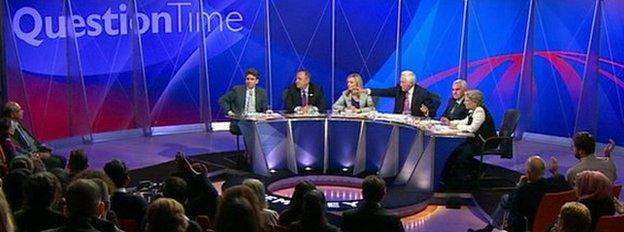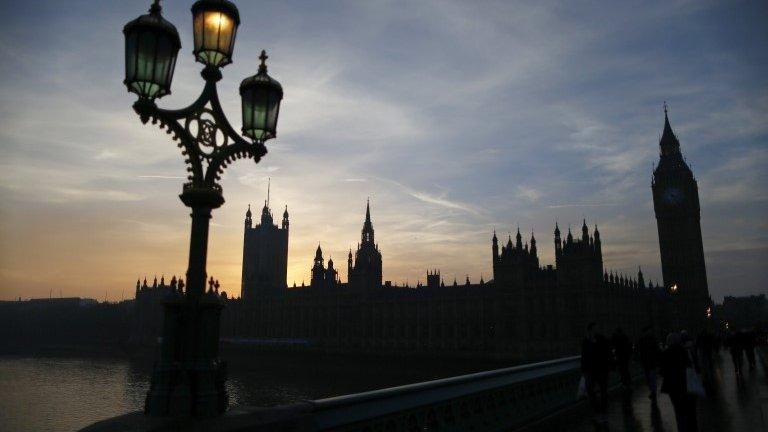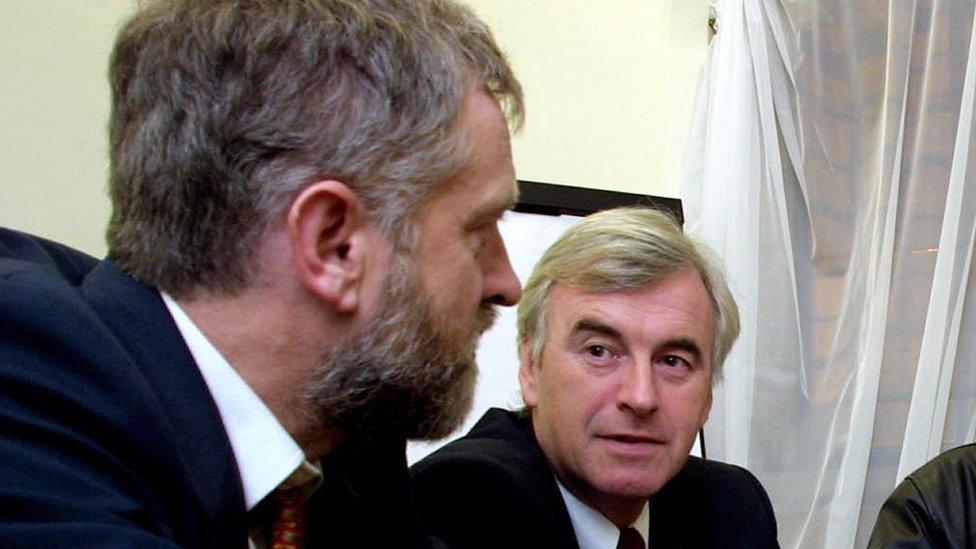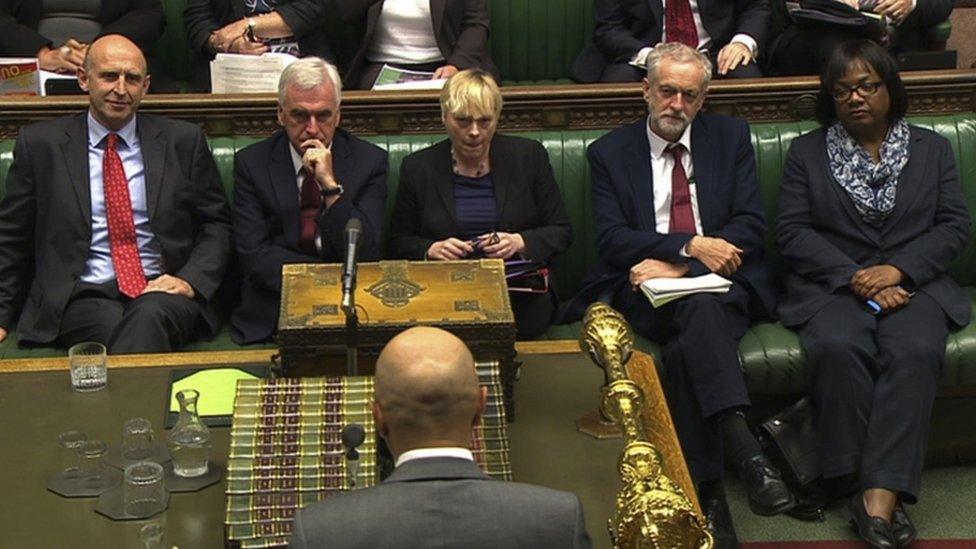John McDonnell sorry for IRA comment
- Published
Chris Mason reports on John McDonnell's apologies for IRA remarks and Thatcher "joke"
Shadow chancellor John McDonnell has apologised for saying in 2003 that IRA members should be "honoured".
The MP, appointed by new Labour leader Jeremy Corbyn, said the comments had clearly caused offence and apologised "from the bottom of my heart".
Speaking on BBC Question Time, he said he had been trying to give both sides of the conflict a way to lay down arms with "some form of dignity".
Unionist politicians welcomed the apology but questioned his motives.
Mr McDonnell also said he was sorry for an "appalling joke" about former Conservative Prime Minister Margaret Thatcher.
In 2010, he said that if he could go back in time he would "assassinate Thatcher".
Challenged on this remark by a member of the audience, he said: "It was an appalling joke. It's ended my career in stand-up, let's put it that way, and I apologise for it as well."
Mr McDonnell's remarks about the "bravery" of the IRA have been highlighted since his appointment to Mr Corbyn's shadow cabinet.
His remarks were made at a gathering in London in 2003 to commemorate IRA hunger striker Bobby Sands.
Mr McDonnell told the meeting: "It's about time we started honouring those people involved in the armed struggle.
"It was the bombs and bullets and sacrifice made by the likes of Bobby Sands that brought Britain to the negotiating table."
Speaking on Question Time on Thursday, he said at the time he made the comments it had looked like "we were going to lose the peace process".

Analysis

By Chris Mason, BBC political correspondent
This was John McDonnell attempting to deal with the most toxic of his comments dredged from a back catalogue of remarks dismissed as insignificant when they were first uttered, but now being held up to scrutiny.
It illustrates the central challenge for the new Labour leadership.
Elected because they offered what was seen as the unspun authenticity of those with track records unsullied by the compromises of office, they are now burdened for the first time with that label "figurehead" - and with it the duty to represent the sensibilities and sensitivities of the whole Labour movement.
And, they hope, in time, the country too.
Jeremy Corbyn and John McDonnell have spent the week wobbling along a tightrope, pointing upwards towards what they see as the virtues of novelty, honesty and freshness.
But a battalion of Labour MPs behind them are pointing in the other direction, down; fearful their party is perilously close to tumbling into a cavern of shambolic misery and irrelevance.

Although the Good Friday Agreement, aimed at bringing an end to the Troubles, came into force in 1998, devolved government in Northern Ireland proved difficult to implement because of disagreements over a range of issues.
Direct rule from Westminster was reintroduced in October 2002, with the Stormont Assembly not returning for nearly five years.
Colin Parry, whose 12-year-old son Tim was killed by an IRA bomb in 1993, says Mr McDonnell's words are "still offensive now"
The MP for Hayes and Harlington said his choice of words in 2003 had been wrong, adding: "What I tried to do for both sides is to give them a way out with some form of dignity otherwise they wouldn't lay their arms down."
He added: "And can I just say this, because this has been raised with me time and time again - I accept it was a mistake to use those words, but actually if it contributed towards saving one life, or preventing someone else being maimed it was worth doing, because we did hold on to the peace process.
"There was a real risk of the republican movement splitting and some of them continuing the armed process. If I gave offence, and I clearly have, from the bottom of my heart I apologise, I apologise."
'Dangerous territory'
Colin Parry, whose 12-year-old son Tim was killed by an IRA bomb in Warrington in 1993, said the apology was welcome "on the face of it", but questioned the MPs motivation for making it.
"How sincere it is or how much it is based on the fact that his political profile has changed, I don't know," he said.
"Far from consolidating the peace process by saying what he did, you could argue that he was giving succour to the view the more you fight, the more you fight on, the better the deal you get."
Nigel Dodds, the deputy leader of the Democratic Unionist Party, suggested the MP had been forced into the apology because of the "strength of public outrage" and urged him to be honest about his "long record" of support for the IRA.
"The credibility of his wording in relation to this apology is undermined by the incredibility of the self-justification we have heard," he told Daily Politics.
"For anyone, least of all him, to pretend this was part of a grand scheme to persuade republicans to lay down arms as part of the peace process...John McDonnell, Jeremy Corbyn and people on the hard left played no role whatsoever in the peace process."
Mr Dodds said Mr McDonnell's views were "totally unrepresentative" of opinion within the wider Labour movement, adding: "We must have people in positions of great seniority who are not in the position where they are supportive of or have condoned violence in the past."
Fellow DUP MP Ian Paisley Jr said he understood that shadow cabinet members would have demanded Mr McDonnell's sacking had he not apologised.
- Published18 September 2015

- Published14 September 2015

- Published14 September 2015
- Published14 September 2015
